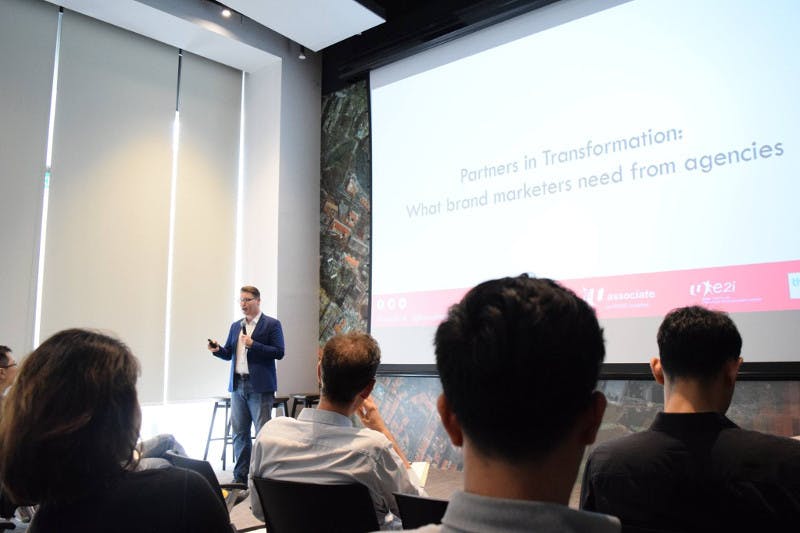Can these differences of opinion ever be resolved? Or are brands and agencies doomed to forever be disappointed with one another?
To find out, Econsultancy recently held a Digital Intelligence Briefing in Singapore and invited Damien Cummings, CEO of Peoplewave, Entrepreneur-in-residence at Econsultancy and long-time marketing leader of many household-name brands to let us all know what brand marketers and agencies need from each other.
The problem
Damien summarized the problem between brand and agencies as a difference in understanding.
- Brand marketers don’t understand agencies and they feel that agencies only offer ‘solutions’ which don’t solve the brand’s real problems.
- Agencies don’t understand brands and agency staff feel that they are victims of unfair cost-cutting, bad briefs and bad clients
Damien summed it up by stating that the ‘business of marketing’ is not well-communicated by brands and, as a result, is not well-understood by agencies.

Marketing strategy
Taking a step back, Damien pointed out that what marketers are trying to achieve is really quite simple.
Brand marketers need to
- understand where their company is today,
- set short-term and long-term goals,
- agree upon objectives for brand value, sales, market share, profit, and customer satisfaction.
Marketers then have four tasks:
- Help set the above objectives
- Come up with a plan for how to get there
- Report on the progress toward these goals
- Put the right marketing capability in place to achieve the objectives
The business of marketing, he noted, is what the brand’s marketing team does on a day-to-day basis to achieve these four tasks.
What motivates the marketer
So, Damien continued, a marketer’s motivations (along with their KPIs and remuneration) are based on business goals such as:
- increasing revenue
- increasing market share
- cutting costs
- lifting brand value
- making customers happy
And while they may use advertisements to achieve these goals, marketers are not judged or motivated by ad campaign performance. The marketer’s job is much more about building internal relationships, getting buy-in from stakeholders and, perhaps most importantly, keeping within a well-defined budget.
So while marketers are keen to know about how agencies can help them, pitches based on new technologies, platform optimizations, or ad performance simply do not address the things that they need to achieve every day.
Damien feels that this fundamental misunderstanding of brand marketers by agencies is widespread and may explain why agencies, in general, feel that they are working with clients who are always irritable and only ever produce ‘bad’ briefs.
What motivates the agency
Agencies, however, have a different view of the world. Instead of being aligned with the goals of their brand partners, agencies are focused on two main goals:
- Increasing revenue
- Building the agency’s reputation
Consequently, agency staff are judged and motivated by increasing fees, attracting more prestigious clients and winning awards. And, as a result, the daily work of someone working for an agency is dominated by replying to briefs, selling in a new campaign idea or reporting on campaign performance.
This means that agencies typically aren’t made aware of the constraints of the marketing budgets or the difficulty marketers face when trying to ‘sell’ the agency’s work internally. Specifically, agency staff aren’t informed about corporate change management procedures which dictate that marketers need to make cuts in order to get the budget for a new campaign or tech platform.
That agencies do not understand how hard it is for marketers to manage change with internal stakeholders likely leads to the notion that agency costs are being cut unfairly by brands.

The solution
Regardless of these misunderstandings, brand marketers and agencies still must work together. But with so much distance between them, how will things ever change?
Damien’s advice for resolving the impasse:
- Brand marketers should share their marketing plans and budgets with agencies. Providing agencies with their motivations will allow agency staff to understand the big picture of what the brand is trying to achieve and give the relationship a purpose.
- Agencies should talk less about campaigns and more about how the agency will help the brand achieve their goals.
- Brand marketers need to tell their agency partners about the change management procedures at their company and that for every new idea proposed by the agency, something else must be cut. Transparency and honesty must be at the core of the relationship.
- Finally, agencies need to be paid fairly for the work they do, including pitches. Having cost as the most important factor in every meeting turns the relationship into a constantly renegotiating transaction. Once a good relationship can be re-established, both sides will be able to have a shared agenda for success and focus on the next steps toward achieving the brand’s goals.
So while brands and agencies are unlikely to suddenly become close partners any time soon, Damien laid out some clear steps both sides can take to move forward together.
A word of thanks
Econsultancy would like to thank Damien Cummings, CEO of Peoplewave, Entrepreneur-in-residence at Econsultancy for sharing his insights about the state of brand/agency relationships gathered from his years of experience in the field.
We’d also like to thank all of the marketers who took time out of their busy schedules to hear about the latest marketing trends from our panel of experts – and we hope to see you all at future Econsultancy events!

Further reading:

Quite surprising that the leader of an agency says that agencies should get paid for pitches 😐
Should I then get paid for any career development training that I undertake in order to be even better value for my clients/brand? Should I get paid for attending seminars, or conferences, or meetings with suppliers?
There is a cost to doing business, and expecting someone to pay for a pitch is expecting to get paid twice for the same piece of work. Cost recovery should come from margins, after all. Otherwise where is the incentive to deliver the best possible pitch if you get paid for any pitch at all. This CEO should automatically know that any of his suggestions should be ones that are able to scale, and paying for pitches is just not feasible in the long run. Not being able to see that, well, makes me think he just pawned this off to some minion to write rather than write it himself (well, I hope that’s the case, rather than the much worse scenarios where he didn’t realise this potential problem in the first place, or was just blinded by greed driven by agency ownership)
As always, there are two sides to this debate, but to get the record straight Damien was in marketing leadership roles at Dell, Philips, Samsung, and Standard Chartered and is now the CEO of an HR-related blockchain company.
He was at Ogilvie 10 years ago, but I believe he is clearly speaking from the brand perspective now.
Agency perspective, I presume.
Ah, but then it shouldn’t be billed as part of a solution to the impasse of ineffective ways of working together. The “solution” then has clear bias towards the agency, will all of the supposed fixes coming from the brand. The only extra fix (point #2) from the agency side, is something they are supposed to do in any case anyways.
And I am totally aware of his impressive work history, which is what ultimately prompted my comment, as this article is not something I would expect from someone of his calibre.
I think he is clearly writing from the brand perspective rather than the agency perspective Paul. If anything he has sold agencies short by listing out all the objectives that a brand has but then only really stating agency objectives as revenue and customer acquisition. I think brands and agencies actually have a lot of the same objectives which is missed out in this article. An agency also needs to deliver customer satisfaction and gain market share in addition to driving revenue and expanding its client base. It’s also worth adding that agency reputations are often built on word of mouth so having such a disconnect between agency and brand doesn’t serve either party well. I think the disconnect mentioned is in no small part connected to the remuneration of agencies. Smaller fees and commission levels over time have led agencies to more aggressively seek compensation in non transparent ways and it’s driven a wedge between the two sides. Business should be a simple affair with one side offering value and the other side paying a good/fair price for that, but this relationship has broken down in our industry. To fix this situation agencies and brands need to have the same motivation, so essentially success for the brand should equal success for the agency and vice versa within reason. Whether too much water has passed under the bridge to reverse the situation though time will tell.
Having spent 15 years in agency management, the view of agency motivations do not align with my experience.
In my experience, most of the items listed as marketer motivations are also motivators for agencies – “we” want to get results for our customers, results equal happy customers, pathing for building reputation and revenue.
I do agree the relationship between agencies and brands is diverging, however, not for the reasons given. Research by Prof Tim Huges and Dr Mario Vafeas on the ‘Client Agency’ relationship (Google it) is far more insightful. So much so, I asked them to present to my agency back in 2015 so we could close the gap by providing more value and deliver a better customer experience – my objectives were not to ‘increase revenue’ or ‘build our reputation’.
Online Business, many thinkinng about it now a days including me..this article is very helpful to me to
know the basic idea of the online stores..and it also very useful to many others..I must say thanks to you..